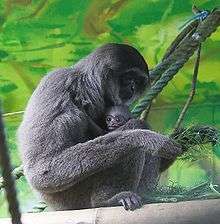Definify.com
Webster 1913 Edition
Ape
Ape
(āp)
, Noun.
[AS.
apa
; akin to D. aap
, OHG. affo
, G. affe
, Icel. api
, Sw. apa
, Dan. abe
, W. epa
.] 1.
(Zool.)
A quadrumanous mammal, esp. of the family
Simiadæ
, having teeth of the same number and form as in man, and possessing neither a tail nor cheek pouches. The name is applied esp. to species of the genus Hylobates
, and is sometimes used as a general term for all Quadrumana. The higher forms, the gorilla, chimpanzee, and ourang, are often called anthropoid apes
or man apes
. ☞ The
ape
of the Old Testament was probably the rhesus monkey of India, and allied forms. 2.
One who imitates servilely (in allusion to the manners of the ape); a mimic.
Byron.
3.
A dupe.
[Obs.]
Chaucer.
Ape
,Verb.
T.
[
imp. & p. p.
Aped
; p. pr. & vb. n.
Aping
.] To mimic, as an ape imitates human actions; to imitate or follow servilely or irrationally.
“How he apes his sire.” Addison.
The people of England will not
ape
the fashions they have never tried. Burke.
Webster 1828 Edition
Ape
APE
, n.1.
A genus of quadrupeds, found in the torrid zone of both continents, of a great variety of species. In common use, the word extends to all the tribe of monkeys and baboons; but in zoology, ape is limited to such of these animals as have no tails; while those with short tails are called baboons, and those with long ones, monkeys. These animals have four cutting teeth in each jaw, and two canine teeth, with obtuse grinders. The feet are formed like hands, with four fingers and a thumb, and flat nails. Apes are lively, full of frolic and chatter, generally untamable, thieving and mischievous. They inhabit the forests, and live on fruits, leaves and insects.2.
One who imitates servilely, in allusion to the manners of the ape; a silly fellow.APE
,Verb.
T.
Definition 2026
Ape
Ape
Italian
Proper noun
Ape f (plural Api)
- a tricycle scooter with a cab for the driver and a pickup truck body over the rear wheels; used as a light delivery van and for small-scale agricultural tasks
See also
Latvian
Pronunciation
Proper noun
Ape f (5th declension)
- A town in Latvia near the border with Estonia.
ape
ape
English

an ape
the silvery gibbon (1)
the silvery gibbon (1)
Noun
ape (plural apes)
- A primate of the clade Hominoidea, generally larger than monkeys and distinguished from them by having no tail.
- Any such primate other than a human.
- (derogatory) An uncivilised person.
Hyponyms
- See also Wikisaurus:ape
Derived terms
Terms derived from ape
Translations
animal
|
|
derogatory: person
Verb
ape (third-person singular simple present apes, present participle aping, simple past and past participle aped)
- (intransitive) To behave like an ape.
- (transitive) To imitate; mimic.
- 1961, J. A. Philip, "Mimesis in the Sophistês of Plato," Transactions and Proceedings of the American Philological Association, vol. 92, p. 454,
- It is not conceived as a mere “aping” in externals nor as an enacting in the sense of assuming a foreign role.
- 1961, J. A. Philip, "Mimesis in the Sophistês of Plato," Transactions and Proceedings of the American Philological Association, vol. 92, p. 454,
Derived terms
Translations
to behave like an ape
|
to imitate
|
Adjective
ape (not comparable)
See also
Anagrams
Finnish
(index ap)
Etymology
Noun
ape
Declension
| Inflection of ape (Kotus type 48/hame, pp-p gradation) | |||
|---|---|---|---|
| nominative | ape | appeet | |
| genitive | appeen | appeiden appeitten |
|
| partitive | apetta | appeita | |
| illative | appeeseen | appeisiin appeihin |
|
| singular | plural | ||
| nominative | ape | appeet | |
| accusative | nom. | ape | appeet |
| gen. | appeen | ||
| genitive | appeen | appeiden appeitten |
|
| partitive | apetta | appeita | |
| inessive | appeessa | appeissa | |
| elative | appeesta | appeista | |
| illative | appeeseen | appeisiin appeihin |
|
| adessive | appeella | appeilla | |
| ablative | appeelta | appeilta | |
| allative | appeelle | appeille | |
| essive | appeena | appeina | |
| translative | appeeksi | appeiksi | |
| instructive | — | appein | |
| abessive | appeetta | appeitta | |
| comitative | — | appeineen | |
Italian
Etymology
From Latin apis, apem.
Pronunciation
- IPA(key): [ˈaːpe]
Noun
ape f (plural api)
Synonyms
- (2) ape da miele, ape domestica
Related terms
Latin
Verb
ape
- second-person singular present active imperative of apō
References
- ape in Charlton T. Lewis and Charles Short (1879) A Latin Dictionary, Oxford: Clarendon Press
Norwegian Bokmål
Pronunciation
- IPA(key): /aːpe/
Etymology 1
Noun
ape f, m (definite singular apa or apen, indefinite plural aper, definite plural apene)
Related terms
Etymology 2
Verb
ape (imperative ap, present tense aper, passive apes, simple past apa or apet or apte, past participle apa or apet or apt, present participle apende)
References
- “ape” in The Bokmål Dictionary.
Norwegian Nynorsk
Etymology 1
Noun
ape m (definite singular apen, indefinite plural apar, definite plural apane)
ape f (definite singular apa, indefinite plural aper, definite plural apene)
Related terms
Etymology 2
Alternative forms
Verb
ape
Conjugation
Conjugation of ape in Nynorsk
Conjugation of ape in Nynorsk
References
- “ape” in The Nynorsk Dictionary.